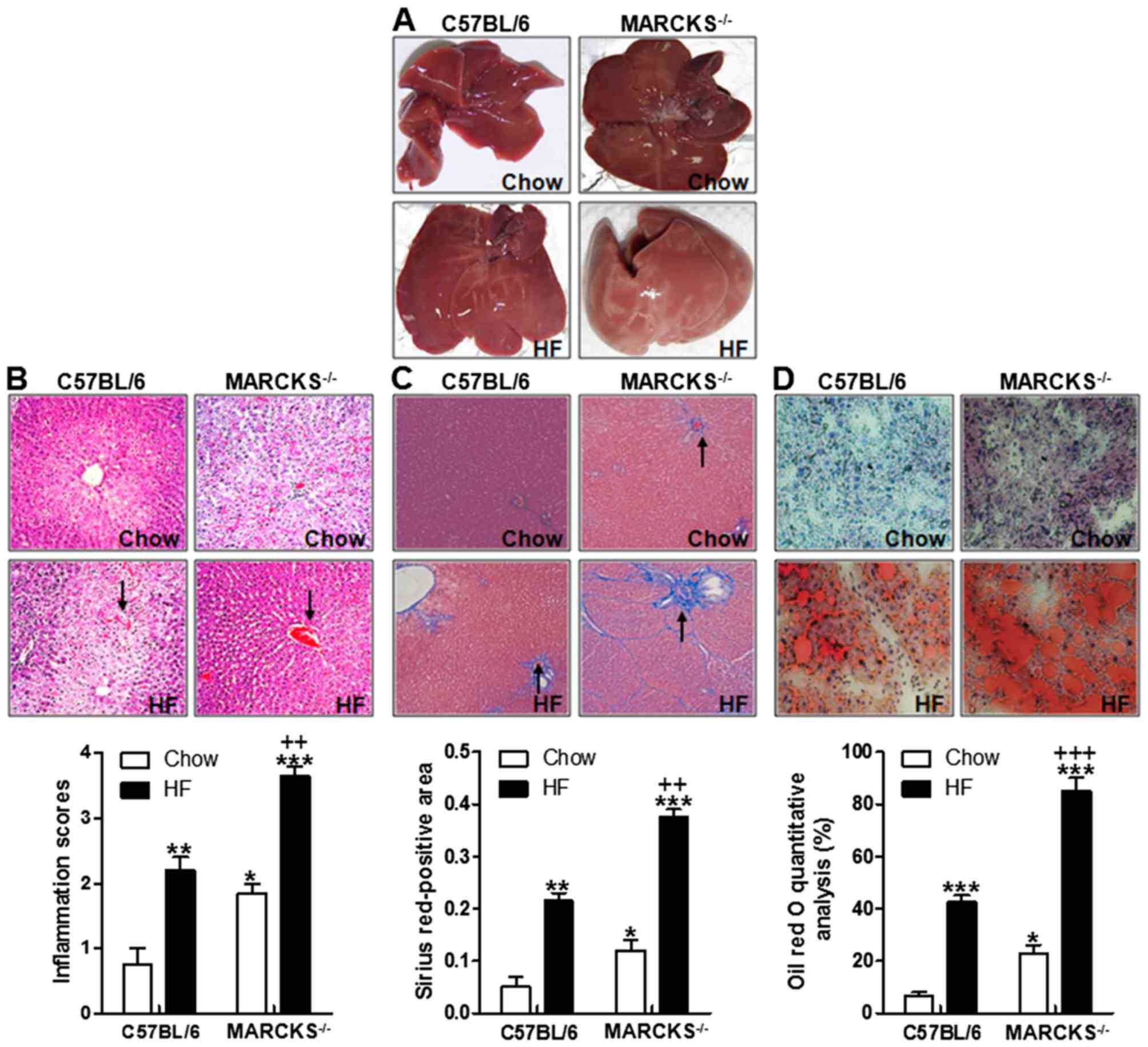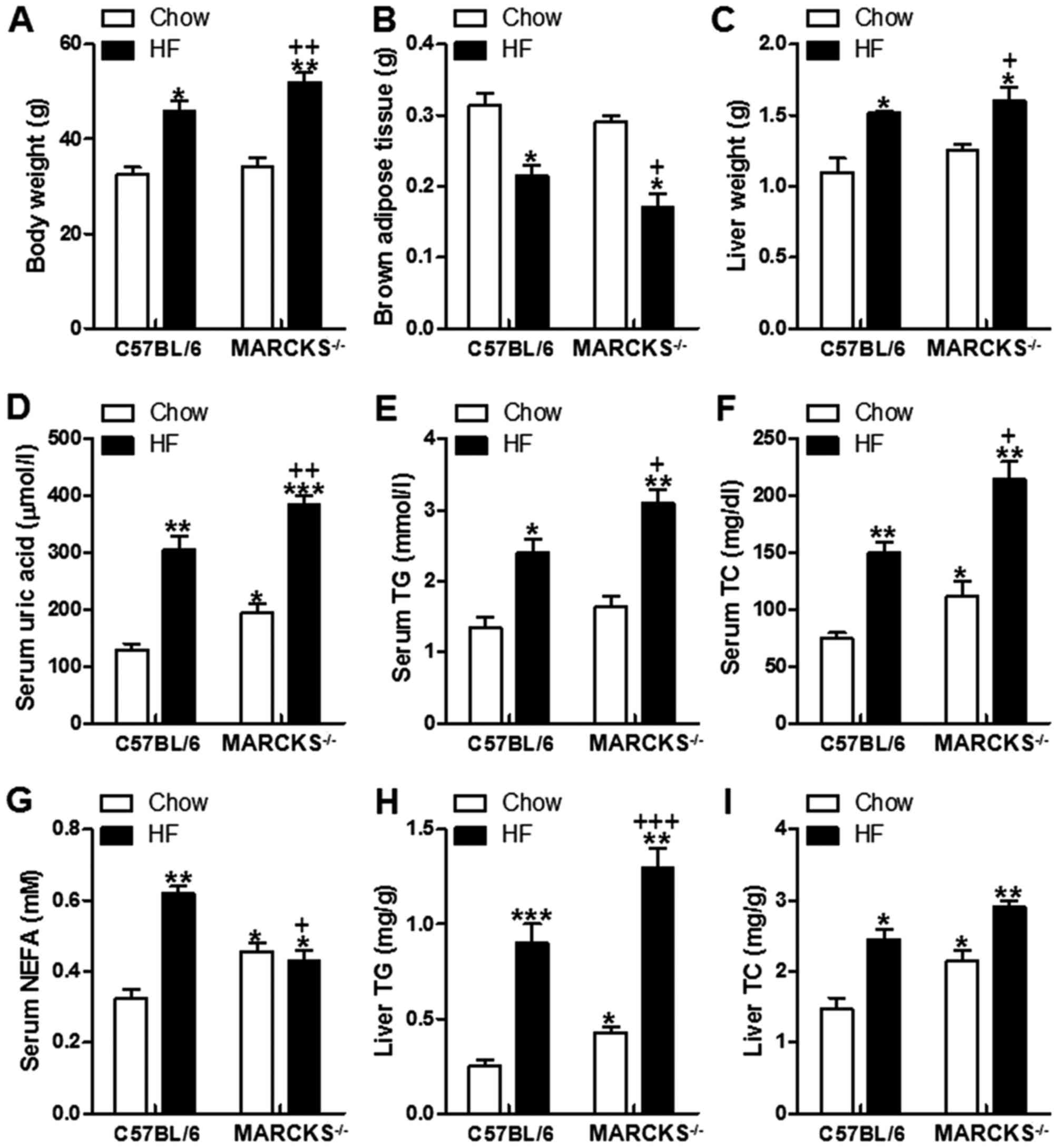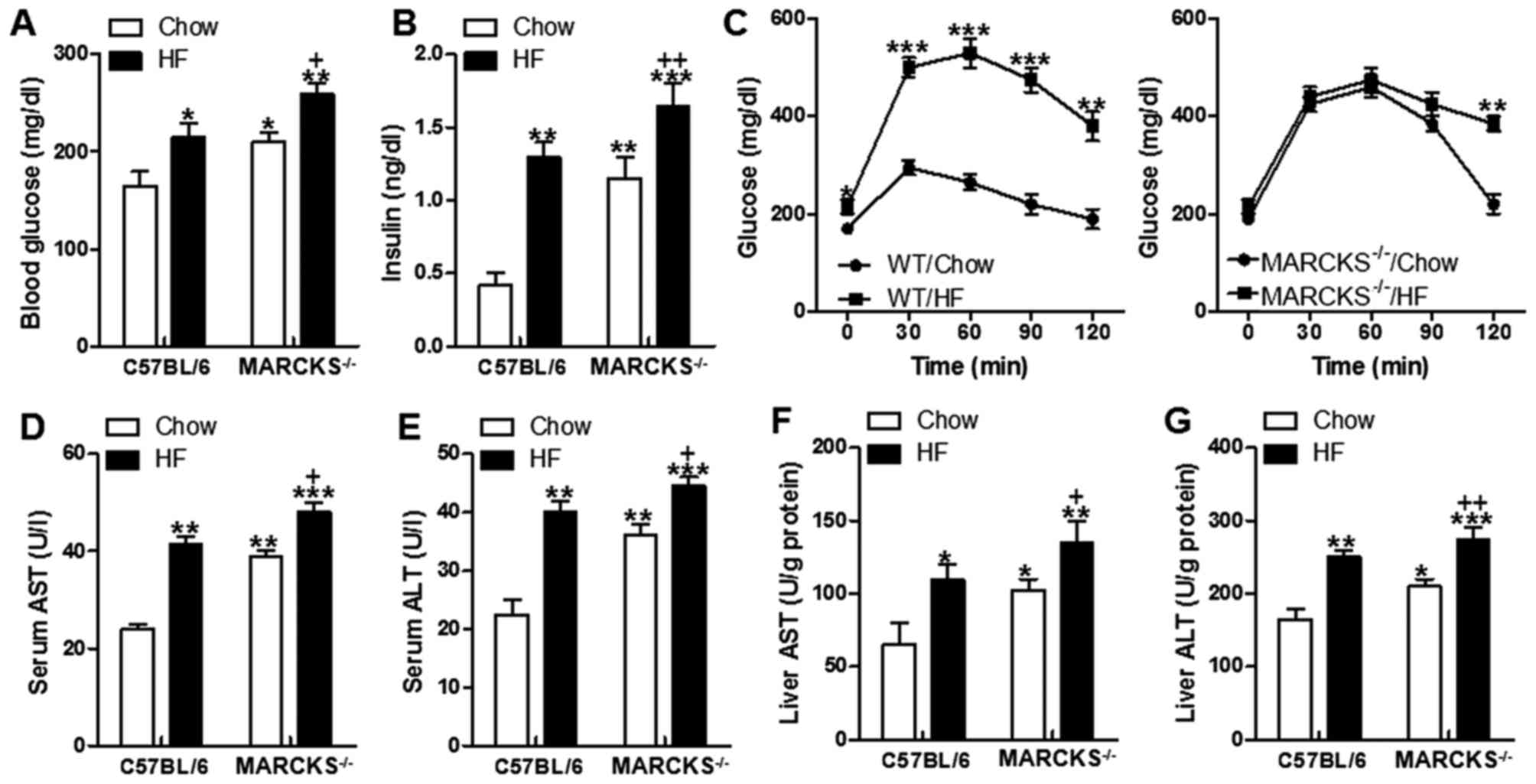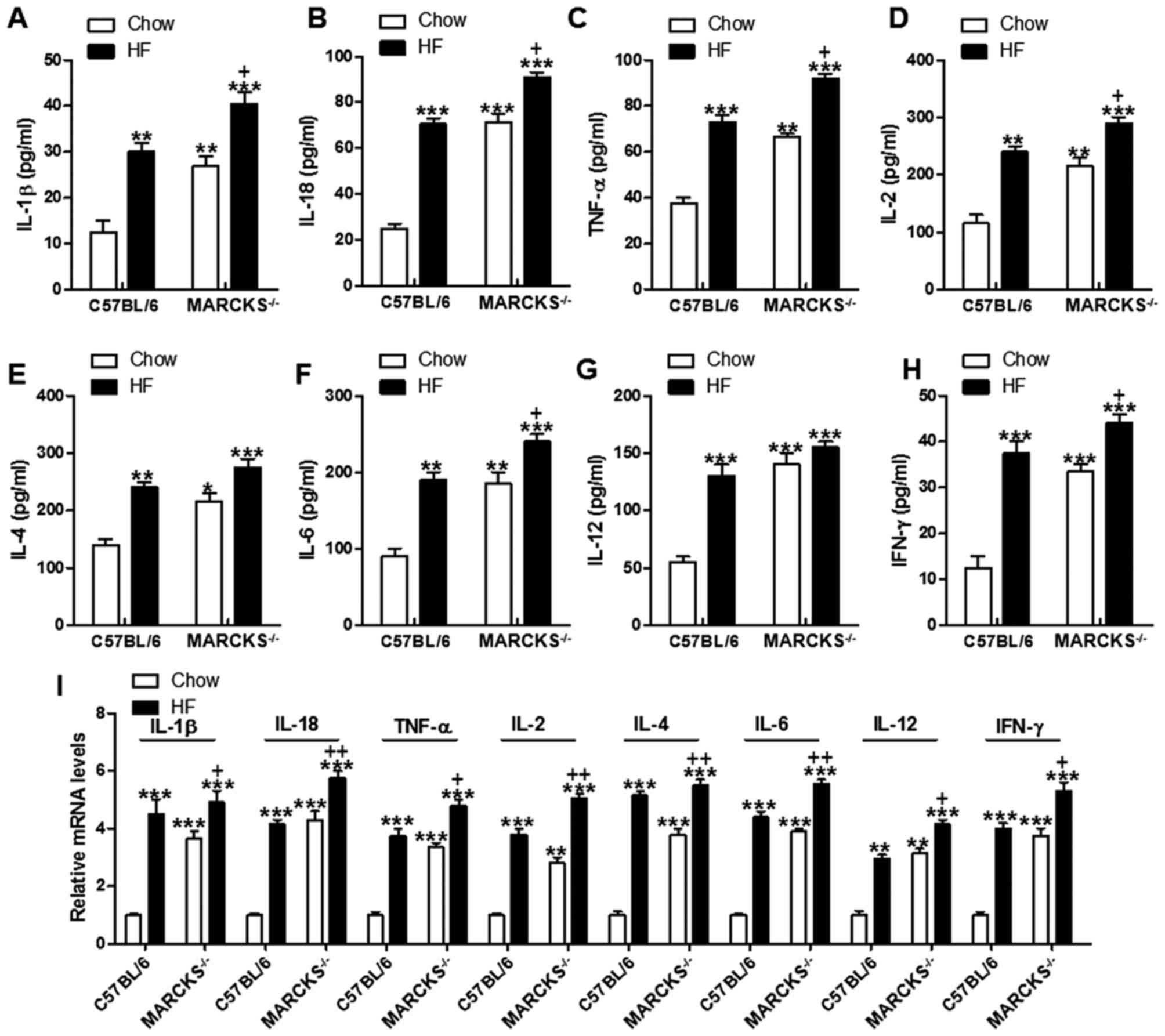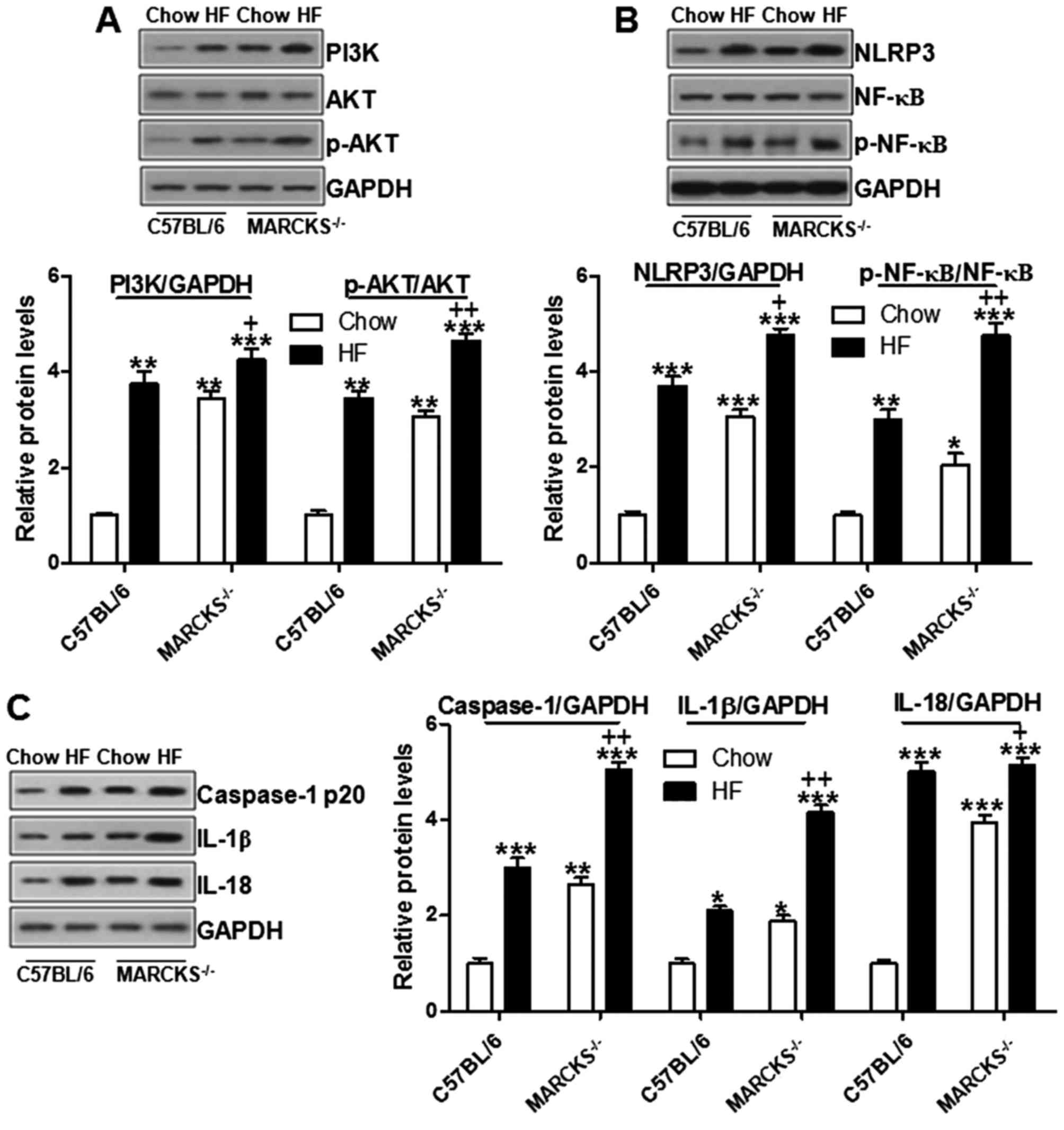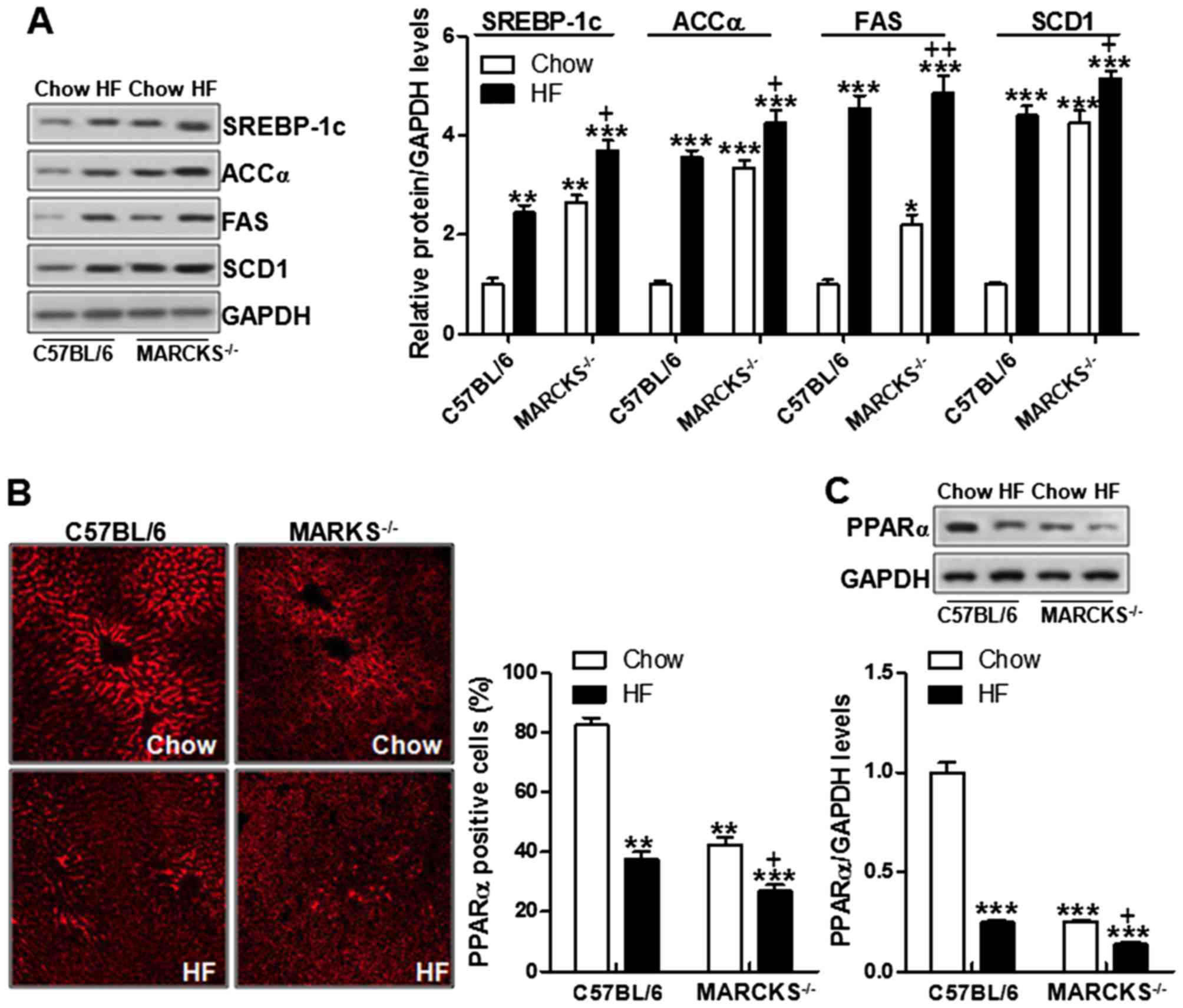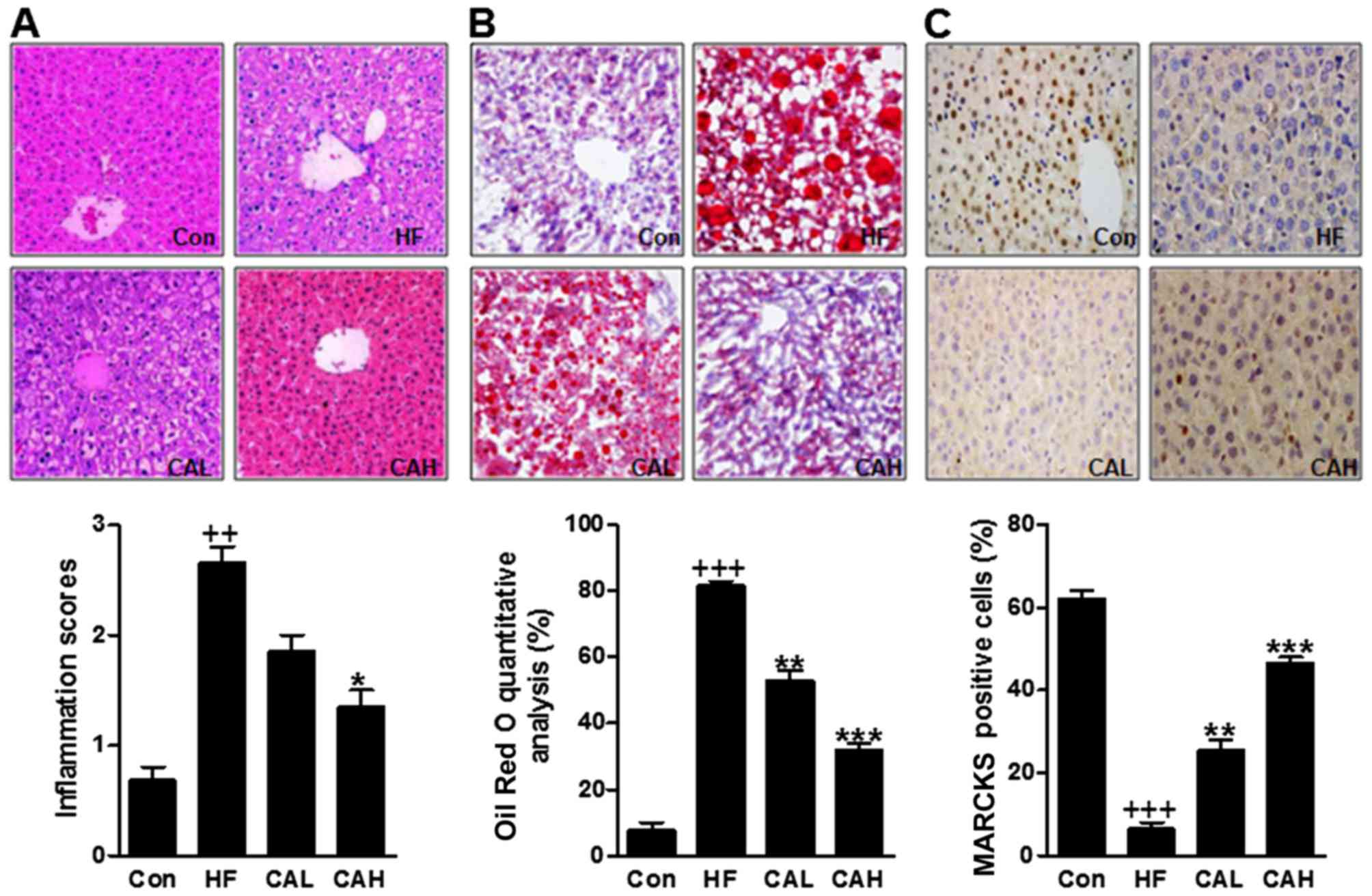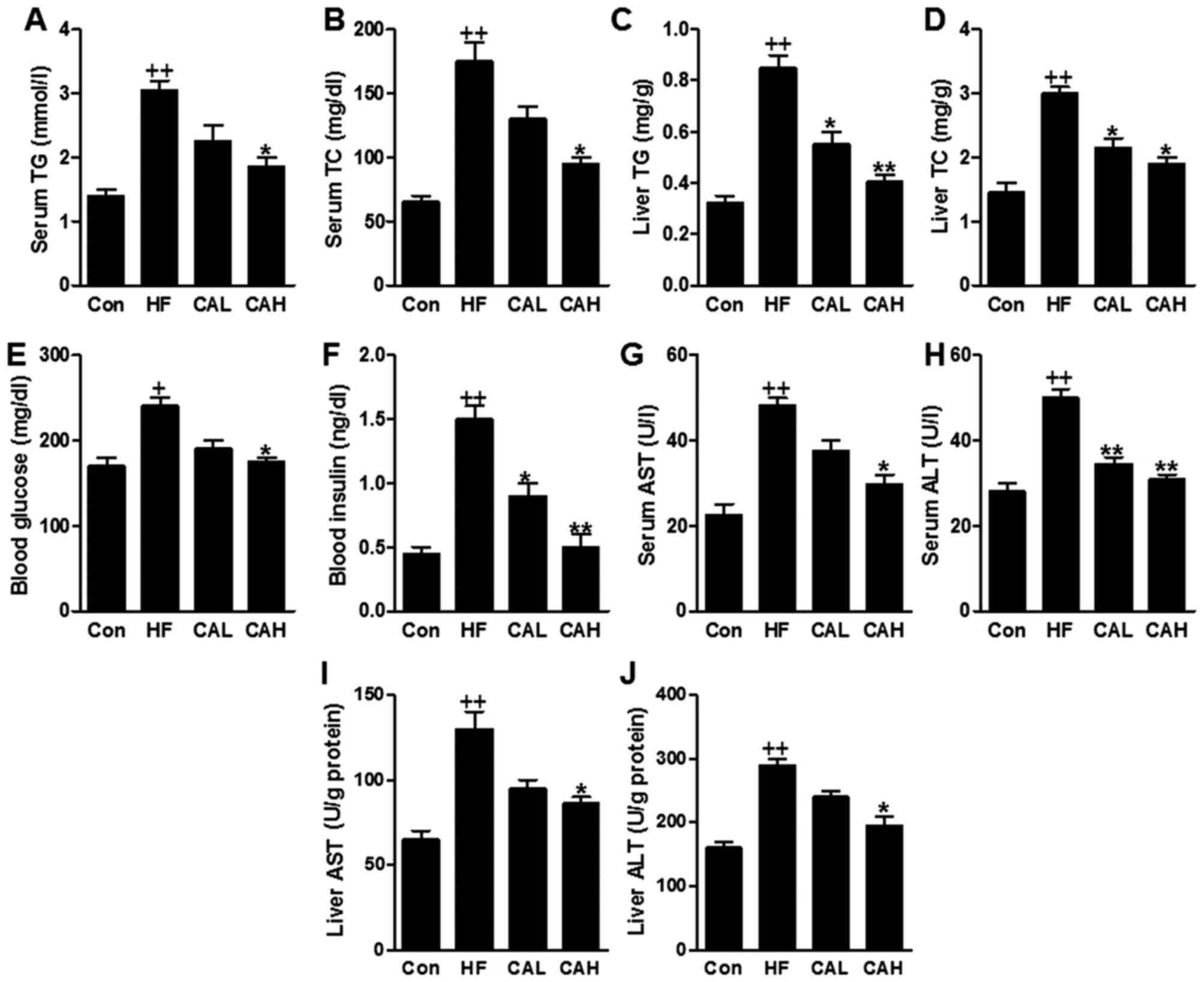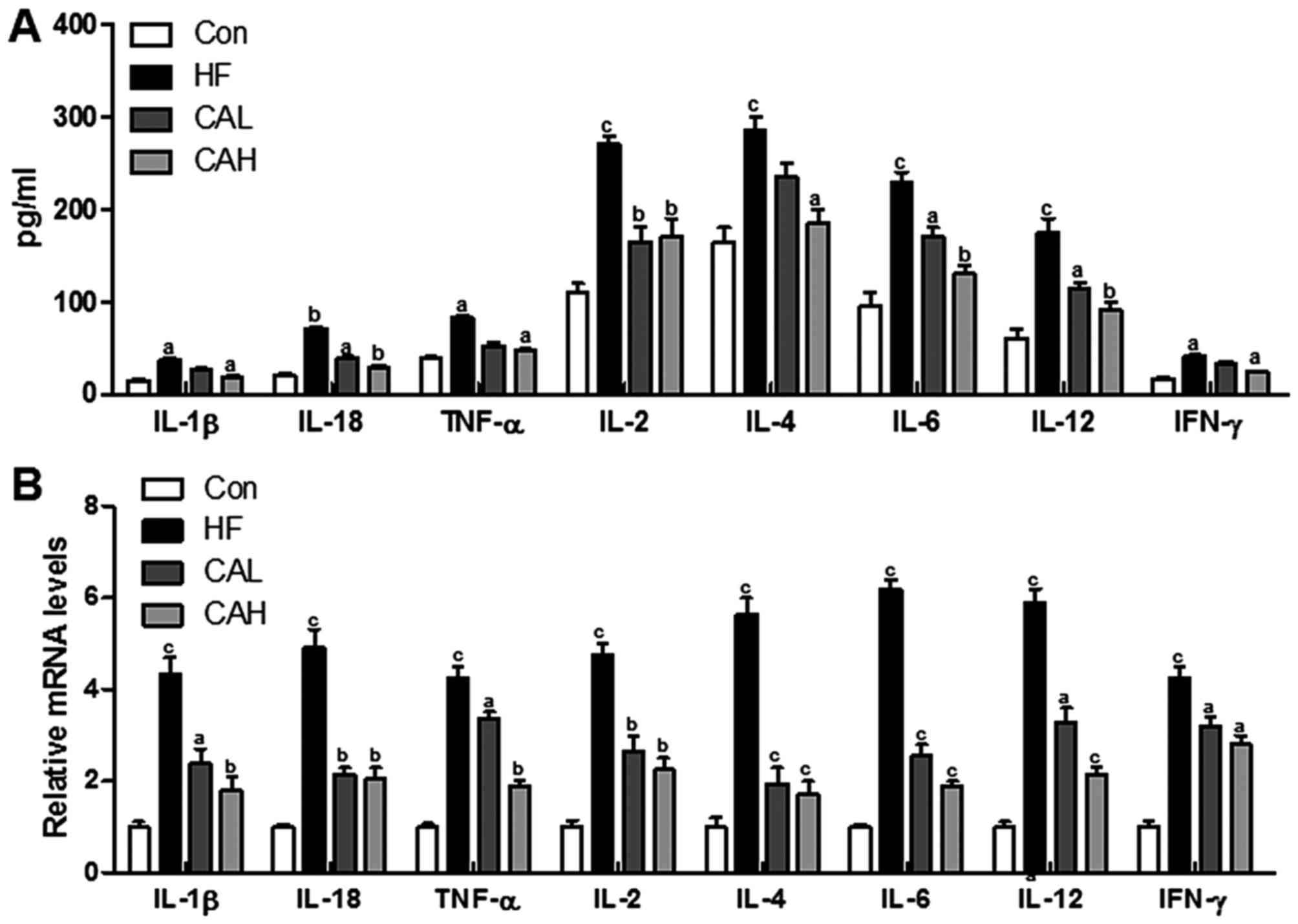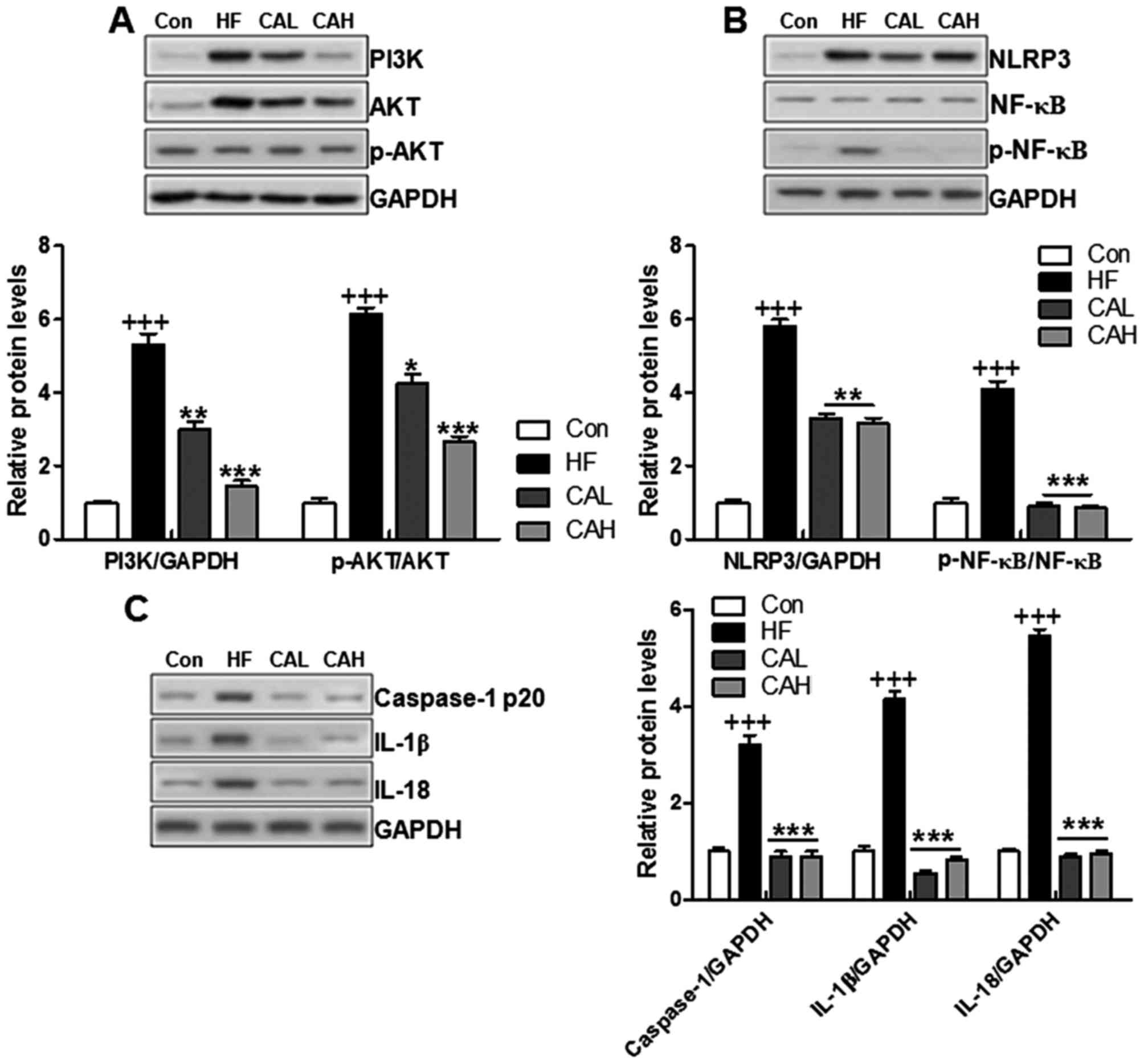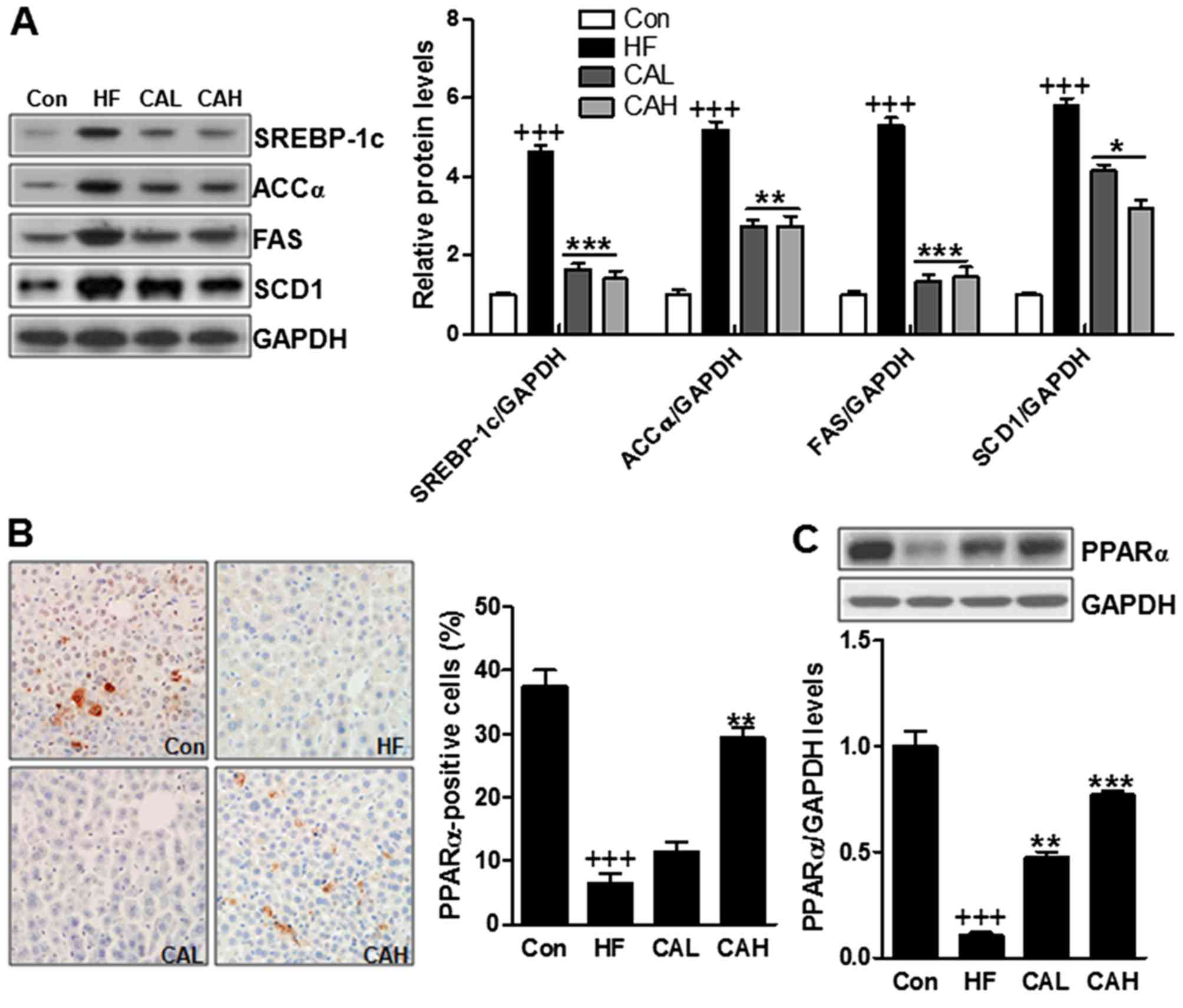|
1
|
Duvnjak M, Lerotić I, Barsić N, Tomasić V,
Virović Jukić L and Velagić V: Pathogenesis and management issues
for non-alcoholic fatty liver disease. World J Gastroenterol.
13:4539–4550. 2007. View Article : Google Scholar : PubMed/NCBI
|
|
2
|
Angulo P: Nonalcoholic fatty liver
disease. N Engl J Med. 346:1221–1231. 2002. View Article : Google Scholar
|
|
3
|
Postic C and Girard J: The role of the
lipogenic pathway in the development of hepatic steatosis. Diabetes
Metab. 34:643–648. 2008. View Article : Google Scholar
|
|
4
|
Yeh MM and Brunt EM: Pathology of
nonalcoholic fatty liver disease. Am J Clin Pathol. 128:837–847.
2007. View Article : Google Scholar : PubMed/NCBI
|
|
5
|
Estep JM, Baranova A, Hossain N, Elariny
H, Ankrah K, Afendy A, Chandhoke V and Younossi ZM: Expression of
cytokine signaling genes in morbidly obese patients with
nonalcoholic steatohepatitis and hepatic fibrosis. Obes Surg.
19:617–624. 2009. View Article : Google Scholar : PubMed/NCBI
|
|
6
|
Lam B and Younossi ZM: Treatment options
for nonalcoholic fatty liver disease. Therap Adv Gastroenterol.
3:121–137. 2010. View Article : Google Scholar : PubMed/NCBI
|
|
7
|
Huang MT, Ho CT, Wang ZY, Ferraro T, Lou
YR, Stauber K, Ma W, Georgiadis C, Laskin JD and Conney AH:
Inhibition of skin tumorigenesis by rosemary and its constituents
carnosol and ursolic acid. Cancer Res. 54:701–708. 1994.PubMed/NCBI
|
|
8
|
Shi B, Wang LF, Meng WS, Chen L and Meng
ZL: Carnosic acid and fisetin combination therapy enhances
inhibition of lung cancer through apoptosis induction. Int J Oncol.
50:2123–2135. 2017. View Article : Google Scholar : PubMed/NCBI
|
|
9
|
Moran AE, Carothers AM, Weyant MJ, Redston
M and Bertagnolli MM: Carnosol inhibits beta-catenin tyrosine
phosphorylation and prevents adenoma formation in the
C57BL/6J/Min/+ (Min/+) mouse. Cancer Res. 65:1097–1104.
2005.PubMed/NCBI
|
|
10
|
Sharabani H, Izumchenko E, Wang Q, Kreinin
R, Steiner M, Barvish Z, et al: Cooperative antitumor effects of
vitamin D3 derivatives and rosemary preparations in a mouse model
of myeloid leukemia. Int J Cancer. 118:3012–3021. 2006. View Article : Google Scholar : PubMed/NCBI
|
|
11
|
Jarboe JS, Anderson JC, Duarte CW, Mehta
T, Nowsheen S, Hicks PH, Whitley AC, Rohrbach TD, McCubrey RO, Chiu
S, et al: MARCKS regulates growth and radiation sensitivity and is
a novel prognostic factor for glioma. Clin Cancer Res.
18:3030–3041. 2012. View Article : Google Scholar : PubMed/NCBI
|
|
12
|
Brooks G, Brooks SF and Goss MW: MARCKS
functions as a novel growth suppressor in cells of melanocyte
origin. Carcinogenesis. 17:683–689. 1996. View Article : Google Scholar : PubMed/NCBI
|
|
13
|
Bickeböller M, Tagscherer KE, Kloor M,
Jansen L, Chang-Claude J, Brenner H, Hoffmeister M, Toth C,
Schirmacher P, Roth W, et al: Functional characterization of the
tumor-suppressor MARCKS in colorectal cancer and its association
with survival. Oncogene. 34:1150–1159. 2015. View Article : Google Scholar
|
|
14
|
Kim J, Shishido T, Jiang X, Aderem A and
McLaughlin S: Phosphorylation, high ionic strength, and calmodulin
reverse the binding of MARCKS to phospholipid vesicles. J Bio Chem.
269:28214–28219. 1994.
|
|
15
|
Lippoldt J, Händel C, Dietrich U and Käs
JA: Dynamic membrane structure induces temporal pattern formation.
BBA-Biomembranes. 1838:2380–2390. 2014. View Article : Google Scholar : PubMed/NCBI
|
|
16
|
Rombouts K, Lottini B, Caligiuri A, Liotta
A, Mello T, Carloni V, Marra F and Pinzani M: MARCKS is a
downstream effector in platelet-derived growth factor-induced cell
motility in activated human hepatic stellate cells. Exp Cell Res.
314:1444–1454. 2008. View Article : Google Scholar : PubMed/NCBI
|
|
17
|
Yu D, Makkar G, Strickland DK, Blanpied
TA, Stumpo DJ, Blackshear PJ, Sarkar R and Monahan TS:
Myristoylated alanine-rich protein kinase substrate (MARCKS)
regulates small GTPase Rac1 and Cdc42 activity and is a critical
mediator of vascular smooth muscle cell migration in intimal
hyperplasia formation. J Am Heart Assoc. 4:e0022552015. View Article : Google Scholar : PubMed/NCBI
|
|
18
|
Zhao Y and Davis HW: Thrombin-induced
phosphorylation of the myristoylated alanine-rich C kinase
substrate (MARCKS) protein in bovine pulmonary artery endothelial
cells. J Cell Physiol. 169:350–357. 1996. View Article : Google Scholar : PubMed/NCBI
|
|
19
|
Campbell JS, Hughes SD, Gilbertson DG,
Palmer TE, Holdren MS, Haran AC, Odell MM, Bauer RL, Ren HP, Haugen
HS, et al: Platelet-derived growth factor C induces liver fibrosis,
steatosis, and hepatocellular carcinoma. Proc Natl Acad Sci USA.
102:3389–3394. 2005. View Article : Google Scholar : PubMed/NCBI
|
|
20
|
Diehl AM, Li ZP, Lin HZ and Yang SQ:
Cytokines and the pathogenesis of non-alcoholic steatohepatitis.
Gut. 54:303–306. 2005. View Article : Google Scholar : PubMed/NCBI
|
|
21
|
Abiru S, Migita K, Maeda Y, Daikoku M, Ito
M, Ohata K, Nagaoka S, Matsumoto T, Takii Y, Kusumoto K, et al:
Serum cytokine and soluble cytokine receptor levels in patients
with non-alcoholic steatohepatitis. Liver Int. 26:39–45. 2006.
View Article : Google Scholar : PubMed/NCBI
|
|
22
|
Neuschwander-Tetri BA, Brunt EM, Wehmeier
KR, Oliver D and Bacon BR: Improved nonalcoholic steatohepatitis
after 48 weeks of treatment with the PPAR-γ ligand rosiglitazone.
Hepatology. 38:1008–1017. 2003. View Article : Google Scholar : PubMed/NCBI
|
|
23
|
Ratziu V, Harrison SA, Francque SM,
Bedossa P, Serfaty L, Gomez MR, et al: An international, phase 2
randomized controlled trial of the dual PPAR α-δ agonist GFT505 in
adult patients with NASH. Hepatology. 62:262A–263A. 2015.
|
|
24
|
Abitbol JL, Broqua P and Junien JL:
Metabolic effects and good tolerance of IVA337 a Pan-PPAR agonist
in diabetic patients warrant further investigation in NASH. J
Hepatol. 64:S1892016. View Article : Google Scholar
|
|
25
|
Pettinelli P, Del Pozo T, Araya J, Rodrigo
R, Araya AV, Smok G, Csendes A, Gutierrez L, Rojas J, Korn O, et
al: Enhancement in liver SREBP-1c/PPAR-α ratio and steatosis in
obese patients: correlations with insulin resistance and n-3
long-chain polyunsaturated fatty acid depletion. Biochim Biophys
Acta. 1792:1080–1086. 2009. View Article : Google Scholar : PubMed/NCBI
|
|
26
|
Bajaj M, Suraamornkul S, Hardies LJ, Glass
L, Musi N and DeFronzo RA: Effects of peroxisome
proliferator-activated receptor (PPAR)-α and PPAR-γ agonists on
glucose and lipid metabolism in patients with type 2 diabetes
mellitus. Diabetologia. 50:1723–1731. 2007. View Article : Google Scholar : PubMed/NCBI
|
|
27
|
Acikgoz Y, Can B, Bek K, Acikgoz A, Ozkaya
O, Genç G and Sarikaya S: The effect of simvastatin and
erythropoietin on renal fibrosis in rats with unilateral ureteral
obstruction. Ren Fail. 36:252–257. 2014. View Article : Google Scholar
|
|
28
|
Mohamed JS, Lopez MA and Boriek AM:
Mechanical stretch upregulates microRNA-26a and induces human
airway smooth muscle hypertrophy by suppressing glycogen synthase
kinase-3β. J Biol Chem. 285:29336–29347. 2010. View Article : Google Scholar : PubMed/NCBI
|
|
29
|
Baker RG, Hayden MS and Ghosh S: NF-κB,
inflammation, and metabolic disease. Cell Metab. 13:11–22. 2011.
View Article : Google Scholar : PubMed/NCBI
|
|
30
|
Chen CH, Statt S, Chiu CL, Thai P, Arif M,
Adler KB and Wu R: Targeting myristoylated alanine-rich C kinase
substrate phosphorylation site domain in lung cancer. Mechanisms
and therapeutic implications. Am J Resp Crit Care. 190:1127–1138.
2014. View Article : Google Scholar
|
|
31
|
Dos Santos S, Delattre AI, De Longueville
F, Bult H and Raes M: Gene expression profiling of LPS-stimulated
murine macrophages and role of the NF-κB and PI3K/mTOR signaling
pathways. Ann Ny Acad Sci. 1096:70–77. 2007. View Article : Google Scholar
|
|
32
|
Hayden MS and Ghosh S: Shared principles
in NF-kappaB signaling. Cell. 132:344–362. 2008. View Article : Google Scholar : PubMed/NCBI
|
|
33
|
Tatsumi S, Mabuchi T, Katano T, Matsumura
S, Abe T, Hidaka H, Suzuki M, Sasaki Y, Minami T and Ito S:
Involvement of Rho-kinase in inflammatory and neuropathic pain
through phosphorylation of myristoylated alanine-rich C-kinase
substrate (MARCKS). Neuroscience. 131:491–498. 2005. View Article : Google Scholar : PubMed/NCBI
|
|
34
|
Raghow R, Yellaturu C, Deng X, Park EA and
Elam MB: SREBPs: the crossroads of physiological and pathological
lipid homeostasis. Trends Endocrinol Metab. 19:65–73. 2008.
View Article : Google Scholar : PubMed/NCBI
|
|
35
|
Blankenship K, Gilley A, Piekarski A,
Orlowski S, Greene E, Bottje W, Anthony N and Dridi S: Differential
expression of feeding-related hypothalamic neuropeptides in the
first generation of quails divergently selected for low or high
feed efficiency. Neuropeptides. 58:31–40. 2016. View Article : Google Scholar
|
|
36
|
Chen H, Zhang L, Li X, Li X, Sun G, Yuan
X, Lei L, Liu J, Yin L, Deng Q, et al: Adiponectin activates the
AMPK signaling pathway to regulate lipid metabolism in bovine
hepatocytes. J Steroid Biochem. 138:445–454. 2013. View Article : Google Scholar
|
|
37
|
Dossi CG, Tapia GS, Espinosa A, Videla LA
and D'Espessailles A: Reversal of high-fat diet-induced hepatic
steatosis by n-3 LCPUFA: role of PPAR-α and SREBP-1c. J Nutr
Biochem. 25:977–984. 2014. View Article : Google Scholar : PubMed/NCBI
|
|
38
|
Pawlak M, Lefebvre P and Staels B:
Molecular mechanism of PPARα action and its impact on lipid
metabolism, inflammation and fibrosis in non-alcoholic fatty liver
disease. J Hepatol. 62:720–733. 2015. View Article : Google Scholar
|
|
39
|
du Plessis J, Korf H, van Pelt J,
Windmolders P, Vander Elst I, Verrijken A, Hubens G, Van Gaal L,
Cassiman D, Nevens F, et al: Pro-inflammatory cytokines but not
endotoxin-related parameters associate with disease severity in
patients with NAFLD. PloS One. 11:e01660482016. View Article : Google Scholar : PubMed/NCBI
|
|
40
|
Lin CY, Chen JH, Fu RH and Tsai CW:
Induction of Pi form of glutathione S-transferase by carnosic acid
is mediated through PI3K/Akt/NF-κB pathway and protects against
neurotoxicity. Chem Res Ttoxicol. 27:1958–1966. 2014. View Article : Google Scholar
|
|
41
|
Zhao M, Zhou A, Xu L and Zhang X: The role
of TLR4-mediated PTEN/PI3K/AKT/NF-κB signaling pathway in
neuroinflammation in hippocampal neurons. Neuroscience. 269:93–101.
2014. View Article : Google Scholar : PubMed/NCBI
|
|
42
|
Boppidi H and Daram SR: Nonalcoholic fatty
liver disease: hepatic manifestation of obesity and the metabolic
syndrome. Postgrad Med. 120:E01–E07. 2008. View Article : Google Scholar : PubMed/NCBI
|
|
43
|
Nakamura A and Terauchi Y: Lessons from
mouse models of high-fat diet-induced NAFLD. Int J Mol Sci.
14:21240–21257. 2013. View Article : Google Scholar : PubMed/NCBI
|
|
44
|
Orecchia A, Mettouchi A, Uva P, Simon GC,
Arcelli D, Avitabile S, Ragone G, Meneguzzi G, Pfenninger KH,
Zambruno G and Failla CM: Endothelial cell adhesion to soluble
vascular endothelial growth factor receptor-1 triggers a cell
dynamic and angiogenic phenotype. FASEB J. 28:692–704. 2014.
View Article : Google Scholar
|
|
45
|
Dorris E, O'Neill A, Hanrahan K, Treacy A
and Watson RW: MARCKS promotes invasion and is associated with
biochemical recurrence in prostate cancer. Oncotarget. 8:720212017.
View Article : Google Scholar : PubMed/NCBI
|
|
46
|
Lee SM, Suk K and Lee WH: Myristoylated
alanine-rich C kinase substrate (MARCKS) regulates the expression
of proinflammatory cytokines in macrophages through activation of
p38/JNK MAPK and NF-κB. Cell Immunol. 296:115–121. 2015. View Article : Google Scholar : PubMed/NCBI
|
|
47
|
Zheng S, Hoos L, Cook J, Tetzloff G, Davis
H Jr, van Heek M and Hwa JJ: Ezetimibe improves high fat and
cholesterol diet-induced non-alcoholic fatty liver disease in mice.
Eur J Pharmacol. 584:118–124. 2008. View Article : Google Scholar
|
|
48
|
Matono T, Koda M, Tokunaga S, Kato J,
Sugihara T, Ueki M and Murawaki Y: Therapeutic effects of ezetimibe
for non-alcoholic steatohepatitis in fatty liver shionogi-ob/ob
mice. Hepatol Res. 41:1240–1248. 2011. View Article : Google Scholar : PubMed/NCBI
|
|
49
|
Kishino Y, Tanaka Y, Ikeda T, Yamamoto K,
Ogawa H, Iwatani Y and Kamisako T: Ezetimibe increases hepatic iron
levels in mice fed a high-fat diet. J Pharmacol Exp Ther.
345:483–491. 2013. View Article : Google Scholar : PubMed/NCBI
|
|
50
|
Choi K and Kim YB: Molecular mechanism of
insulin resistance in obesity and type 2 diabetes. Korean J Intern
Med. 25:119–129. 2010. View Article : Google Scholar : PubMed/NCBI
|
|
51
|
Mackenzie RW and Elliott BT: Akt/PKB
activation and insulin signaling: A novel insulin signaling pathway
in the treatment of type 2 diabetes. Diabetes Metab Syndr Obes.
7:55–64. 2014. View Article : Google Scholar : PubMed/NCBI
|
|
52
|
Bagul PK, Middela H, Matapally S, Padiya
R, Bastia T, Madhusudana K, Reddy BR, Chakravarty S and Banerjee
SK: Attenuation of insulin resistance, metabolic syndrome and
hepatic oxidative stress by resveratrol in fructose-fed rats.
Pharmacol Res. 66:260–268. 2012. View Article : Google Scholar : PubMed/NCBI
|
|
53
|
Chandrashekaran V, Dattaroy D, Das S,
Alhasson F, Seth R, Carson J, Berger F, Zielnoka J, Kalyanaraman B
and Chatterjee S: The receptor for advanced glycation end product
(RAGE) binding to HMGB1 and subsequent NADPH oxidase activation
mediates ectopic intestinal inflammation in NAFLD. Free Radical
Biol Med. 100:S372016. View Article : Google Scholar
|
|
54
|
Calle MC and Fernandez ML: Inflammation
and type 2 diabetes. Diabetes Metab. 38:183–191. 2012. View Article : Google Scholar : PubMed/NCBI
|
|
55
|
Hadad N and Levy R: The synergistic
anti-inflammatory effects of lycopene, lutein, β-carotene, and
carnosic acid combinations via redox-based inhibition of NF-κB
signaling. Free Radical Biol Med. 53:1381–1391. 2012. View Article : Google Scholar
|
|
56
|
Segovia J, Sabbah A, Mgbemena V, Tsai SY,
Chang TH, Berton MT, Morris IR, Allen IC, Ting JP and Bose S:
TLR2/MyD88/NF-κB pathway, reactive oxygen species, potassium efflux
activates NLRP3/ASC inflammasome during respiratory syncytial virus
infection. PLOs One. 7:e296952012. View Article : Google Scholar
|
|
57
|
Vandanmagsar B, Youm YH, Ravussin A,
Galgani JE, Stadler K, Mynatt RL, Ravussin E, Stephens JM and Dixit
VD: The NLRP3 inflammasome instigates obesity-induced inflammation
and insulin resistance. Nat Med. 17:179–188. 2011. View Article : Google Scholar : PubMed/NCBI
|
|
58
|
Fu S, Yang L, Li P, Hofmann O, Dicker L,
Hide W, Lin X, Watkins SM, Ivanov AR and Hotamisligil GS: Aberrant
lipid metabolism disrupts calcium homeostasis causing liver
endoplasmic reticulum stress in obesity. Nature. 473:528–531. 2011.
View Article : Google Scholar : PubMed/NCBI
|
|
59
|
Ahmed MH and Byrne CD: Modulation of
sterol regulatory element binding proteins (SREBPs) as potential
treatments for non-alcoholic fatty liver disease (NAFLD). Drug
Discov Today. 12:740–747. 2007. View Article : Google Scholar : PubMed/NCBI
|
|
60
|
Reddy JK: Peroxisomal β-oxidation, PPARα,
and steatohepatitis. Am J Physiol-Gastr L. 281:G1333–G1339.
2001.
|















